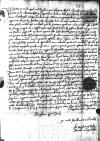List #4168
Stephanus TOBIE do Ioannes DANTISCUSLöbau (Lubawa), 1539-06-20
Regest polski:
Stephanus Tobie dziękuje za otrzymany list. Z wdzięcznościa przyjmuje podarunek w postaci upragnionego "Ideoty".
Zawiadamia o śmierci księcia miśnieńskiego Jerzego [of Saxony] oraz jego syna Fryderyka, który zmarł wkrótce po ślubie z [Elżbietą] von Mansfeld. Dziedziczy po nich Henryk, brat Jerzego. Ta zmiana władzy niepokoi zakonników
Zawiadamia, że Dantyszek wkrótce otrzyma odpowiedź prowincjała (minister) franciszkanów w sprawie swojej propozycji odnośnie do conventuum duorum restituenda reformatione [przywrócenia w dwóch klasztorach reguły reformatów?]. Najpóźniej w dniu Św. Bartłomieja [24 sierpnia] oczekuje przybycia ojca komisarza, który tę odpowiedź wyłuszczy. Tobie spodziewa się, że będzie osobiście zajmował się tą sprawą.
| odebrano [1539]-06-22 Rękopiśmienne podstawy źródłowe:
Pomocnicze podstawy źródłowe:
Publikacje:
| ||||||||
Tekst + aparat krytyczny + komentarz Zwykły tekst Tekst + komentarz Tekst + aparat krytyczny
Reverendissimo in Christo Patri ac Domino, domino
Iesum et omne, quod animam perenniter felicitat.
Reverendissime, carissime Pater et Domine.
Datas ex Vestra Observandissima Paternitate superioribus diebus cf.
cf. Iacobus Faber Stapulensis (Jacques Lefèvre d'Étaples), Contemplationes Idiotae, Paris, 1519 ⌊Ideotamcf. Iacobus Faber Stapulensis (Jacques Lefèvre d'Étaples), Contemplationes Idiotae, Paris, 1519 ⌋ insuper in maius studium augendi candoris optima fide litteris donatum gratanter suscepi. Cuius rei gratia habeo Reverendissimae Paternitatis Vestrae favori gratias quam omnium maximas. Aptum siquidem munus, quo alitur mutuum amici pectoris officium, nam ipsum multo voto petitum, Paternitas Vestra - munuficentissimam perinde ac gratissimam rem - obtulit, quatenus intelligam esse illo ipso cf. Iacobus Faber Stapulensis (Jacques Lefèvre d'Étaples), Contemplationes Idiotae, Paris, 1519 ⌊Ideotacf. Iacobus Faber Stapulensis (Jacques Lefèvre d'Étaples), Contemplationes Idiotae, Paris, 1519 ⌋ repositum, quicquid mihi tam anxie cupienti gratius offerre Dominatio Vestra Reverendissima valuerit. Erit igitur penes me in perpetuum dilectionis monumentum et amoris inter nos mutui vinculum indissolubile; semper (quod precaverim) Deum pro Paternitate Vestra pro viribus obnixe humiliterque oraturus.
Reor praeterea haud latere Amplitudinem Vestram Reverendissimam illustrissimum ac vere catholicum
Iam nunc potest reverendus pater minister noster sancto respondere Reverendissimae Paternitatis Vestrae proposito, quod coram exoptavit per venerabilem patrem
Salutare Christus cum Reverendissima Dominatione Vestra, cunctis opere ferens commodis, iugiter sit ac laboret. Cui Paternitatem Vestram Reverendissimam una mecum reddo commendatissimum.
Ex
Eiusdem Reverendissimae Dominationis Vestrae ex animo sacellanus et clientulus, frater
Postscript:
Verbosior sum, quam par erat, oro veniam bonique consulere, urgebat enim caritas.

